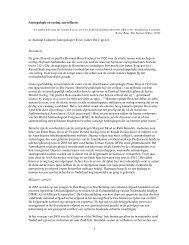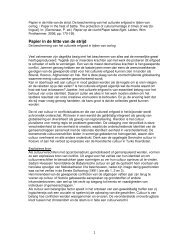The whole publication in PDF - Culture in Development
The whole publication in PDF - Culture in Development
The whole publication in PDF - Culture in Development
Create successful ePaper yourself
Turn your PDF publications into a flip-book with our unique Google optimized e-Paper software.
disaster management programmes. He hopes that more African libraries will develop disaster management<br />
programmes <strong>in</strong> the future through <strong>in</strong>formation available to national committees (Alegbeleye, G., 1999).<br />
6.5.4 ICBS<br />
<strong>The</strong> Blue Shield is the cultural equivalent of the Red Cross. It is the symbol specified <strong>in</strong> the 1954 Hague Convention<br />
(see above) for mark<strong>in</strong>g cultural sites to give them protection from attack <strong>in</strong> the event of armed conflict. It is also<br />
the name of an <strong>in</strong>ternational committee set up <strong>in</strong> 1996 to protect the world’s cultural heritage threatened by wars<br />
and natural disasters.<br />
<strong>The</strong> ICBS, the International Committee of the Blue Shield,is the stand<strong>in</strong>g emergency coord <strong>in</strong>ation and response<br />
committee of the four pr<strong>in</strong>cipal UN ESCO -associated non-governmental professional bodies for the cultural pro perty<br />
area, i.e. the International Council on Archives (ICA), International Federation of Library Associations and<br />
Institutions (IFLA), International Council of Museums (ICOM), and International Council on Monuments and Sites<br />
(ICOMOS). <strong>The</strong>y work together to prepare for and respond to emergency situations that could affect cultural<br />
heritage and cover museums and archives, historic sites and libraries. <strong>The</strong>y respect the follow<strong>in</strong>g pr<strong>in</strong>ciples:<br />
• jo<strong>in</strong>t actions;<br />
• <strong>in</strong>dependence;<br />
• neutrality;<br />
• professionalism;<br />
• respect of cultural identity;<br />
• work on not-for-profit basis.<br />
It is vital that the <strong>in</strong>ternational <strong>in</strong>itiative is taken up and supported by local <strong>in</strong>itiatives. Blue Shield Committees are<br />
be<strong>in</strong>g formed <strong>in</strong> a number of countries. <strong>The</strong> work of the ICBS was recognised <strong>in</strong> the Second Protocol to the Hague<br />
Convention, agreed <strong>in</strong> April 1999 by 84 countries. This gives ICBS a new role, to advise the <strong>in</strong>ter-governmental<br />
Committee for the Pro tection of Cultural Property <strong>in</strong> the Event of Armed Conflict.<br />
6.5.5 IDNDR and ISDR<br />
At the beg<strong>in</strong>n<strong>in</strong>g of 1990 the United Nations (UN) launched the International Decade for Natural Disaster Reduction<br />
(IDNDR 1990 – 2000) to make people aware of how much they can do to make themselves safer from natural<br />
disaster. <strong>The</strong> UN programme has undoubtedly achieved much good, although it has had little impact on the average<br />
person and little effect on reduc<strong>in</strong>g the severity of disasters worldwide.<br />
<strong>The</strong> last decade of the 20 th century has seen a number of natural disasters. In the Asia/Pacific region alone there<br />
were major floods <strong>in</strong> Bangladesh and Ch<strong>in</strong>a, an extremely severe earthquake <strong>in</strong> Japan and devastat<strong>in</strong>g bush fires <strong>in</strong><br />
Australia. In all of these cases there has been criticism of the adequacy of preparation and the effectiveness of<br />
responses. This view is sup ported by the conclusions reached at a mid-cycle review of the programme at a Wo rld<br />
Conference on Natural Disaster Reduction <strong>in</strong> Yokohama, Japan, 23 – 27 May 1994, attended by representatives from<br />
155 countries (Lyall, 1997). Despite criticism, the programme is cont<strong>in</strong>u<strong>in</strong>g. In 1999 the International Strategy for<br />
Disaster Reduction (ISDR) was adopted at the IDND R Programme Forum as the successor arrangement to the<br />
IDNDR. It reaffirms the necessity for disaster reduction and risk management to become essential elements of<br />
government policies. <strong>The</strong> ISDR will strive towards enabl<strong>in</strong>g all societies to become resilient to the effects of natural<br />
hazards, <strong>in</strong> order to reduce human, economic and social losses. This vision will f<strong>in</strong>d its realisation by focus<strong>in</strong>g on<br />
the follow<strong>in</strong>g six objectives:<br />
• <strong>in</strong>creas<strong>in</strong>g public awareness;<br />
• obta<strong>in</strong><strong>in</strong>g commitment from public authorities;<br />
• stimulat<strong>in</strong>g <strong>in</strong>terdiscipl<strong>in</strong>ary and <strong>in</strong>ter-sectoral partnership and expand<strong>in</strong>g risk reduction network<strong>in</strong>g at all levels;<br />
• improv<strong>in</strong>g further the scientific knowledge of the causes of natural disasters and the effects of natural hazards<br />
and related technological and environmental disasters on societies;<br />
• cont<strong>in</strong>u<strong>in</strong>g <strong>in</strong>ternational cooperation to reduce the impacts of El Niño and other climatic variables;<br />
• strengthen<strong>in</strong>g disaster reduction capacities through Early Warn<strong>in</strong>g.<br />
For more on IDNDR see Ingleton, 1999.<br />
6.5.6 ECHO<br />
S<strong>in</strong>ce 1994, the ECHO , the European Com munity Humanitarian Office, has been f<strong>in</strong>anc<strong>in</strong>g disaster prevention,<br />
mitigation and prep aredness o perations throughout the develop<strong>in</strong>g world, <strong>in</strong> response to the requests of NGOs,<br />
<strong>in</strong>ternational organisations and universities/research <strong>in</strong>stitutes. Although EC HO’s mandate is to provide and fund<br />
humanitarian aid, it does more than just that. It carries out studies, sets up coord<strong>in</strong>ation arrangements, promotes and<br />
coord<strong>in</strong>ates disaster prevention measures by tra<strong>in</strong><strong>in</strong>g specialists, strengthen<strong>in</strong>g <strong>in</strong>stitutions and runn<strong>in</strong>g pilot microprojects.<br />
ECHO also organises tra<strong>in</strong><strong>in</strong>g programmes and raises pub lic awareness about hum anitarian issues <strong>in</strong><br />
Europe and elsewhere.






